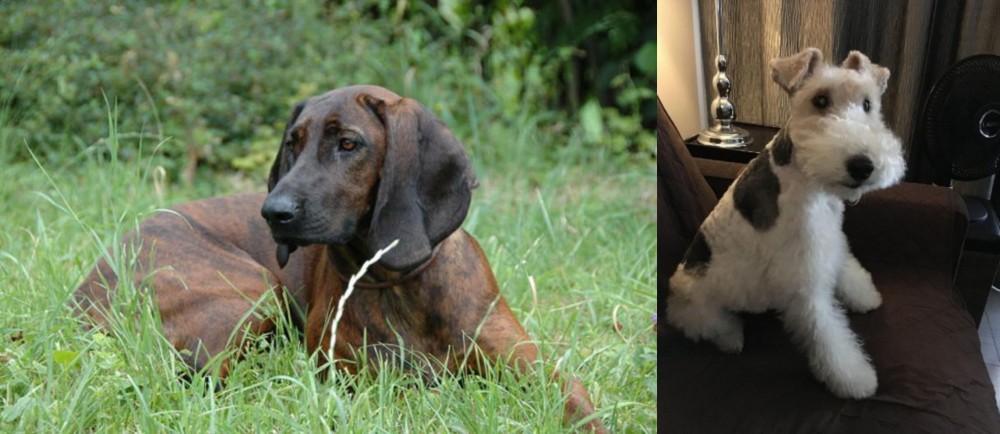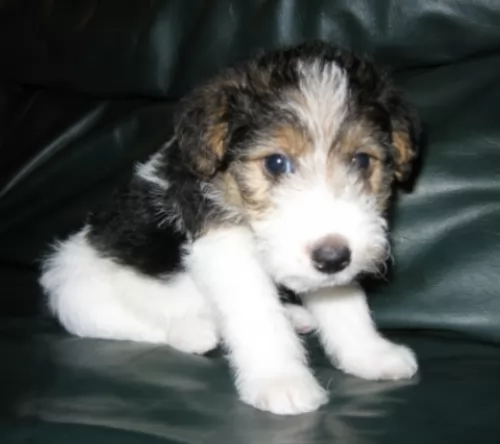 Petzlover
Petzlover Hanover Hound is originated from Germany but Wire Haired Fox Terrier is originated from United Kingdom. Hanover Hound may grow 17 cm / 7 inches higher than Wire Haired Fox Terrier. Hanover Hound may weigh 44 kg / 98 pounds more than Wire Haired Fox Terrier. Both Hanover Hound and Wire Haired Fox Terrier has same life span. Both Hanover Hound and Wire Haired Fox Terrier has almost same litter size. Hanover Hound requires Low Maintenance. But Wire Haired Fox Terrier requires Moderate Maintenance
Hanover Hound is originated from Germany but Wire Haired Fox Terrier is originated from United Kingdom. Hanover Hound may grow 17 cm / 7 inches higher than Wire Haired Fox Terrier. Hanover Hound may weigh 44 kg / 98 pounds more than Wire Haired Fox Terrier. Both Hanover Hound and Wire Haired Fox Terrier has same life span. Both Hanover Hound and Wire Haired Fox Terrier has almost same litter size. Hanover Hound requires Low Maintenance. But Wire Haired Fox Terrier requires Moderate Maintenance
 Sometimes referred to as a Hanoverian Hound, this dog dates way back to the 17th century in Germany.
Sometimes referred to as a Hanoverian Hound, this dog dates way back to the 17th century in Germany.
This dog breed continues to be fairly rare today and has always been used as a hunting and tracking dog. It is believed the dog comes from bloodhounds dating back to medieval times. The dog isn’t recognized by the AKC but he is a member of the Scenthound group.
 The Wire Haired Fox Terrier originates in England, and it is thought that the dog developed from the white English Terrier being crossed with the Bull Terrier and maybe even the Beagle.
The Wire Haired Fox Terrier originates in England, and it is thought that the dog developed from the white English Terrier being crossed with the Bull Terrier and maybe even the Beagle.
The hunting crowd wanted a dog that was small enough to disappear down a hole to flush out a fox.
Even though the Wire Haired Fox Terrier used to be a pet of Queen Victoria as well as King Edward VII, it only became popular as a family pet in the 1930s.
 This is a sturdy, well built dog with a short, smooth, dense coat which is a reddish-brown color with brindling.
This is a sturdy, well built dog with a short, smooth, dense coat which is a reddish-brown color with brindling.
He is a well built, deep chested dog standing at about 50 – 55cm in height and weighing 48-53cm. He has the typical dark brown, soulful eyes of the Hound dog with long, broad, floppy ears.They usually have black noses, he has a deep chest, strong, straight legs and long, tapering tail.
Calm and gentle, the Hanover Hound is a loyal dog who bonds closely with his human family. When you socialize him he gets along well with children.
He is a hunting dog and loves nothing more than to be following some scent. You can call out his name, but he will not likely take notice, so determined is he to track down his prey, being known for his superb sense of smell.
His hunting instincts are strong and this means that you won't often find him being kept essentially as just a pet – they are first hunting dogs and then pets. Nonetheless, as already suggested, the Hanover Hound is more than capable of forming a strong bond with his human family, making a good family pet.
He is aloof and wary with strangers and this makes him a good watchdog. It is important to have him trained and socialized as then he becomes obedient and amicable when you need him to be like that around friends and family.
 The Wirehaired Fox Terrier is a medium-sized dog, standing at between 33 and 38cm in height and weighing between 6 and 9 kg.
The Wirehaired Fox Terrier is a medium-sized dog, standing at between 33 and 38cm in height and weighing between 6 and 9 kg.
The face is fairly long and he has semi-erect, semi-floppy ears and the high set tail is usually docked. The double coat is wiry, curly and coarse and is essentially white with tan or black markings. White is always the predominant color of the Wire Haired Fox Terrier.
This little dog is cheerful, cheeky, playful, feisty, lovable and full of the joys of life. He is also strong-willed and independent.
He makes a great playmate for kids and loves being in the company of his human family. He will get on well with other pets in the family too.
He is intelligent which means you can have him easily trained and socialized and the kids will love to teach him some tricks too. He is a high energy dog and will require a good dose of exercise.
 The Hanover Hound is an intelligent dog breed that responds well to training and socialization. They are dedicated hunting dogs but they are loyal and loving to their human family.
The Hanover Hound is an intelligent dog breed that responds well to training and socialization. They are dedicated hunting dogs but they are loyal and loving to their human family.
He will require an owner who is active and on the go while being firm and consistent with his treatment of him.
When socialized, he makes a good friend of children too. Keep him busy, exercise him, provide him with good food and consistent love and attention and he'll make you a devoted hunting companion and friend.
 One thing is for sure – when you bring a Wire Haired Fox Terrier into your home, you’re going to have a dog with endless energy. It is why they make such good pets when you’ve got kids in the house.
One thing is for sure – when you bring a Wire Haired Fox Terrier into your home, you’re going to have a dog with endless energy. It is why they make such good pets when you’ve got kids in the house.
They like to please their owners and they respond well to training and socialization. They’re also brave and protective, making good watchdogs.
They’re loving, loyal and companionable, and there are plenty of stories about the loyalty of these dogs. Anyone who has had one of them as a pet will tell you what splendid dogs they are.
 Capable of living to between 10 and 14 years of age, the Hanover Hound, like many other dogs, may well be prone to some of the more common dog illnesses there are.
Capable of living to between 10 and 14 years of age, the Hanover Hound, like many other dogs, may well be prone to some of the more common dog illnesses there are.
Because of his long, floppy ears, he will typically be more prone to developing otitis externa. This is why it is important to be checking your long, floppy-eared dog regularly and cleaning his ears to avoid wax- and dirt build-up and infection. Chronic ear infections will have to be treated by your vet.
You'll recognize the illness when you see your pet shaking his head often and scratching at his ears.
This is a genetic orthopedic disorder that affects many dogs and will eventually cause lameness. Hip dysplasia is due to malformed hip joints.
Eye diseases and problems with the eyelid can cause your pet a lot of discomfort as this is when an eyelid rolls in and then rubs against the eye.
 These robust little dogs can succumb to any one of the many common dog illnesses there are -
These robust little dogs can succumb to any one of the many common dog illnesses there are -
The Wirehaired Foxy is a healthy dog, but it is thought that Epilepsy could be a problem with this breed. Your spunky dog may seem a little bit confused before he falls to the floor lying on his side and twitching like he’s having a bad dream.
This is brought on by uncontrolled bursts of electrical activity in the dog’s brain. The seizure can last for a minute or so but even so, whether it is a twitch or violent shuddering, it can leave you shocked and disturbed.
He can sometimes even urinate during the seizure. It is imperative to get your pet to the vet who will know precisely how it can be controlled.
Dental disease is also a common problem with dogs and unfortunately, your Wire Haired Fox Terrier also battles with this. The problem starts with tartar build-up on the teeth and then it can cause infection of the gums and roots of the teeth.
Left unattended to, your pet could lose his teeth, and it jeopardizes your pet’s health as well.
 The Hanover Hound is a hunting breed so he won’t easily adapt to life in the city with a tiny garden. He will need a large garden or a farm to run around in.
The Hanover Hound is a hunting breed so he won’t easily adapt to life in the city with a tiny garden. He will need a large garden or a farm to run around in.
He is a hunting dog that loves to put his nose to the ground and to follow a scent. This is a dog breed which will need to be provided with a good amount of exercise every day to ensure his happiness and health.
As a large dog breed, you want to be sure to be feeding him a high quality food. It is always a good idea to add in some home-made food to his kibble. Read the packaging carefully of commercial manufactured dog foods and make sure you get food that is geared towards large, active breed dogs.
Add in cooked food such as cooked chicken, vegetables or brown rice and pasta and remember to include some raw meat into his diet from time to time.
Before dogs were domesticated they would eat raw meat as opposed to harmful grain based commercial dog foods of today. Benefits of adding in some raw meat from time to time include healthier skin, more energy and shinier coats and eyes. Make sure your pet has a constant supply of fresh, cool water.
 Groom your pet. Brush twice weekly. Wire Haired Fox Terrier owners like to hand their pets in at professional groomers to have their hair cut short and made more manageable. The hair is kept quite long around the muzzle.
Groom your pet. Brush twice weekly. Wire Haired Fox Terrier owners like to hand their pets in at professional groomers to have their hair cut short and made more manageable. The hair is kept quite long around the muzzle.
Provide your pet with the best food there is. Always buy high quality food that can contribute to your pet’s health and which is suitable for his size, age and activity levels. The Wire Haired Fox Terrier is inclined to be a greedy dog and with a dog like this weight gain can slowly increase and can become a health problem.
Spay or Neuter. This is an excellent idea for your pet if you don’t want puppies. Not only that, spaying or neutering actually decreases the likelihood of your pet getting some types of cancer.